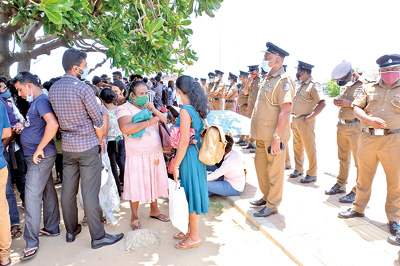News
Botched graduate jobs scheme leaves thousands stranded
The government’s scheme for unemployed graduates is mired in confusion this week after thousands of job-seekers who received appointment letters before the election were booted off the list.

Students gathered outside the Presidential Secretariat on Tuesday. Pic by Amila Gamage
And, while Cabinet on Wednesday approved 10,000 more slots in addition to the pre-poll quota of 50,000 after protests, rejected candidates were informed they would have to lodge appeals before September 15, at the nearest Divisional Secretariat, and would not automatically qualify for the positions they lost.
“The rejected list will have to appeal to be reconsidered even for the extra allocation of 10,000 jobs,” J.J. Rathnasiri, Public Services Ministry Secretary said.
The government is set to spend more than Rs. 14.4 billion (at a salary of Rs. 20,000 per graduate) in the first year alone.
The initial process of sending out appointment letters had been “very rushed” the Secretary admitted.
There had been no prior evaluation process; an advertisement with requirements was published and distributed. When the scheme was suspended while the general election was held, officials had time to revisit the applications and filter them for false information.
On Tuesday, the graduates whose letters of appointment were cancelled protested outside the Presidential Secretariat. Passing by, President Gotabaya Rajapaksa told them to go home as Cabinet had approved 10,000 more jobs and they would all receive jobs.
But, said Mr. Rathnasiri, some appointment letters had been cancelled because graduates had provided false information in their applications.
“We said clearly that the unemployed graduates’ scheme was for unemployed graduates, not for graduates who have jobs,” , Mr. Rathnasiri said.
Notices on the President’s website confirmed this, stating the Grama Niladari and Divisional Secretariat of the relevant applicant should certify that the applicant was unemployed post-graduation for one year as at 1 January 2020.
Pathirawasam Amila Iroshani, 30, from Kelaniya University was one of those outside the Presidential Secretariat on Tuesday. The mother of two also needs to pay her sick mother’s medical bills.
“I was desperate after I graduated in 2016 so I took up a typing job on contract at a union for a salary of Rs 14,500,” she related. “My employer deducted EPF and ETF from it. This was the reason given to disqualify me after they checked with the Labour Department.”
Ms Pathirawasam is particularly furious that she had even assumed duties after being called to work on March 4-5 at the Wellaweediya Divisional Secretariat.
The training she was receiving was suspended, first due to the pandemic, then the Elections Commission’s orders against the granting of employment in the run-up to an election.
The protests by the Combined Association of Unemployed Graduates means job-seekers who are currently employed or in jobs they believe are “unsuitable” can now appeal with documentary proof of employment, designation, etc. Their eligibility will be assessed case by case.
Most of the demonstrators were graduates who had taken on meagre jobs for survival, Ms Pathirawasam said, asking why they were being penalised for this.
Other graduates who had been previously employed alongside her in the same workplace have now been selected, claimed Nayani Bandara, also from Kelaniya University. She had a private job at the time she received the appointment letter.
“We had great hopes,” she said. “We were initially told we would be recalled on May 4 but that didn’t happen because of the COVID-19 situation and elections. Then we were told we would be recalled on September 2.”
Interviews revealed vast inconsistencies and inefficiencies in the criteria employed to reject or select candidates, as well as the ministry’s communication strategy.
The rejected and selected lists were posted in different languages and there were discrepancies in the reasons given for rejection as some graduates who had been previously employed were chosen.
Dinusha Sewwandi, a Bangalore University graduate, was rejected as she had a foreign degree but the institute is recognised by Sri Lanka’s University Grants Commission (UGC) as it is part of the Association of Commonwealth Universities.
The fact that appointment letters were granted and then withdrawn is a key issue, said Isuru Sohan, a grassroots activist.
President Rajapaksa announced plans to enlist unemployed graduates to government jobs in January this year. Criteria included graduation from a UGC-recognised university and an age limit of 35 years and under (later changed to 45 years and under).
Around 70,000 applications were received, with 56,000 being correctly completed. The UGC and other offices identified 45,585 candidates as qualified for jobs under the scheme.
They were expected to report to work within three days of receiving the appointment letters. The project was halted and restarted on August 15.

